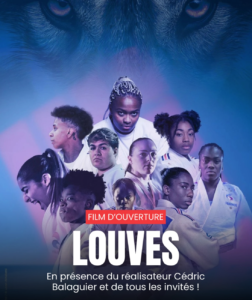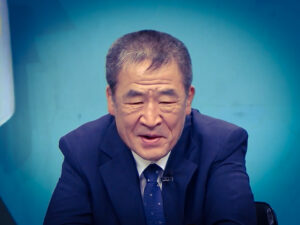In the early spring of 2025, Teddy Riner and Valentin Houinato, each in their own way, made the news in post-Olympic judo. Two dojos, two moods. – JudoAKD#033.
A French version of this article is available here.
On the left, Teddy Riner, thirty-six years old on 7 April. Five individual and mixed Olympic titles. Eleven world titles. Five European titles in as many appearances. Twelve unbeaten seasons in the last fifteen on the tour. On Saturday 5th and Sunday 6th April, the O100kg category kicks off the Riner Cup in style. The event takes place in the aptly named Arena Teddy Riner in Asnières-sur-Seine, Hauts-de-Seine. These two days are the pilot episode in a series of XXL events designed to unite people around an anthem in the style of Pierre de Coubertin: ‘To participate is already to win’.
On his right is Valentin Houinato, who turned 28 on 15 October. In the months leading up to the Paris Olympics, this judoka and budding journalist wrote a radio column for France Inter, La Prépa, about his slow ascent to the Games where, living and training in his French homeland, he would qualify in the U81kg category to defend the flag of his paternal Benin – a theme of dual nationality that has become familiar to many in recent years.
Eight months after the closing ceremony of the Olympic Games, it would be an understatement to say that the two men are on very different paths. For Teddy Riner, the first is a restorative holiday to recover, according to the JudoInside website, from the second busiest season of international competition in his career after 2008, including seven fights in two days on 2 and 3 August to complete, at the ripe old age of 35, the first Olympic double of his two prolific decades on the front line. Then there was the European Cup for mixed club teams in Montpellier in December, which he won comfortably with PSG Judo, only donning his judogi as an individual in the final. Then there was a surgery on his right elbow at the beginning of January and his outspoken views on social issues such as the high cost of living in the French West Indies, the reduction in the national Sports budget and the wearing of headscarves in sport. Each of these earned him a few hours of trending on X – such are the times, with their penchant for one-off polemics and divisions that are exaggerated according to the person who embodies them, but which, taken together, and to paraphrase the filmmaker Terrence Malick, hardly help ‘make the grass grow or the sun shine’.
At the same time, Valentin Houinato is experiencing a tough autumn and a scorching winter, both mentally and physically. He confided this to Cléa Lepesqueux in the French weekly L’Équipe magazine at the end of March 2025, a few weeks after his first interview with Maxime Baron in the daily Ouest France. At the heart of the Disillusionment dead end in which the Maisons-Alfort resident seems to confide, is the terrible backlash that hits most non-medal winning judokas in the weeks, months and even years following their return from Olympics. On the upside, there’s the hype of a season – ephemeral compared to a lifetime – leading up to the D-day. The promising impression of being a being, a protagonist like the character played by John David Washington in Christopher Nolan’s Tenet, all on two fronts: judo and journalism. On the flipside, the realization – all the more terrifying because it comes after the event – that he may have been just another number in the crowd. A competitor who was qualified, prepared and announced, but who was very quickly eliminated, as the Summer Olympics and their Darwinian DNA have been producing by the thousands since 1896. But also a journalist who discovers that without his specific gold card as a judoka in search of the qualification to the Games, he is suddenly less interesting in the eyes of the profession once these Games are over. A double career like a single-shot pistol. « We think we’re wicks, but we’re just tallow », said Jacques Brel in ‘Voir un ami pleurer’ [‘To See a Friend Cry’]. The slap in the face is violent – and Etienne Garnier’s photos show how it has undermined his body language in the space of a few months. Running two rabbits at once is still no guarantee of outrunning the tortoises.
Only a few kilometers away, but light-years away in reality, it is the desire to « give back to [his] sport what it has given him » that prevails on the part of the Asnières host. Two days of fights, from cadets to seniors, with former footballer Djibril Cissé on the DJ decks and quite a few French and foreign champions on hand to lend their sporting prestige to this first event, which, in the winning spirit of its founder, will be followed by others. A milestone event for a post-career that will be all the richer for the prospects it has opened up over his last twenty years on the road.
In her short essay Le Soin est un humanisme [Care is a Humanism], published in 2019, the French philosopher and psychoanalyst Cynthia Fleury writes the following lines: « Experience is what protects us from the fascination of certainty, it is what makes us understand that knowledge, uncertainty and fallibility work together, and the obligation to experience, to live knowledge, to feel it, to experiment with it, to try to reproduce it, allows us to consolidate steps despite more than shifting ground. John Dewey warned us: ‘We must be concerned about the consequences, we must take care of them’. An action whose consequences are not considered teaches us nothing in itself. And consequences are meaningless unless they are related to the action that produced them. The action and its consequences together make up an experience. It’s not enough to do an experience: to ‘have an experience’, we might trivially say, you have to have lived, which means you also have to have suffered, to have endured the consequences of what you do. This close relationship between doing, suffering and enduring is what we call experience. » Paradoxically, it is in the rare failures of Teddy Riner’s long career, and the way in which he overcame them and still transcends them to the point of turning them into a contagious lever, that Valentin Houinato, like many others, will no doubt find cause for hope. – Anthony Diao, spring 2025. Opening pictures: Paco Lozano. Editing: Thomas Eustratiou-Diao/JudoAKD.
A French version of this article is available here.
More articles in English:
-
- JudoAKD#001 – Loïc Pietri – Pardon His French
- JudoAKD#002 – Emmanuelle Payet – This Island Within Herself
- JudoAKD#003 – Laure-Cathy Valente – Lyon, Third Generation
- JudoAKD#004 – Back to Celje
- JudoAKD#005 – Kevin Cao – Where Silences Have the Floor
- JudoAKD#006 – Frédéric Lecanu – Voice on Way
- JudoAKD#008 – Annett Böhm – Life is Lives
- JudoAKD#009 – Abderahmane Diao – Infinity of Destinies
- JudoAKD#010 – Paco Lozano – Eye of the Fighters
- JudoAKD#011 – Hans Van Essen – Mister JudoInside
- JudoAKD#021 – Benjamin Axus – Still Standing
- JudoAKD#022 – Romain Valadier-Picard – The Fire Next Time
- JudoAKD#023 – Andreea Chitu – She Remembers
- JudoAKD#024 – Malin Wilson – Come. See. Conquer.
- JudoAKD#025 – Antoine Valois-Fortier – The Constant Gardener
- JudoAKD#026 – Amandine Buchard – Status and Liberty
- JudoAKD#027 – Norbert Littkopf (1944-2024), by Annett Boehm
- JudoAKD#028 – Raffaele Toniolo – Bardonecchia, with Family
- JudoAKD#029 – Riner, Krpalek, Tasoev – More than Three Men
- JudoAKD#030 – Christa Deguchi and Kyle Reyes – A Thin Red and White Line
- JudoAKD#031 – Jimmy Pedro – United State of Mind
- JudoAKD#032 – Christophe Massina – Twenty Years Later
- JudoAKD#034 – Anne-Fatoumata M’Baïro – Of Time and a Lifetime
- JudoAKD#035 – Nigel Donohue – « Your Time is Your Greatest Asset »
- JudoAKD#036 – Ahcène Goudjil – In the Beginning was Teaching
- JudoAKD#037 – Toma Nikiforov – The Kalashnikiforov Years
- JudoAKD#038 – Catherine Beauchemin-Pinard – The Rank of Big Sister
- JudoAKD#039 – Vitalie Gligor – « The Road Takes the One Who Walks »
- JudoAKD#040 – Joan-Benjamin Gaba and Inal Tasoev – Mindset Matters
- JudoAKD#041 – Pierre Neyra – About a Corner of France and Judo as It Is Taught There
- JudoAKD#042 – Theódoros Tselídis – Between Greater Caucasus and Aegean Sea
- JudoAKD#043 – Kim Polling – This Girl Was on Fire
- JudoAKD#044 – Kevin Cao (II) – In the Footsteps of Adrien Thevenet
- JudoAKD#045 – Nigel Donohue (II) – About the Hajime-Matte Model
- JudoAKD#046 – A History of Violence(s)
- JudoAKD#047 – Jigoro Kano Couldn’t Have Said It Better
- JudoAKD#048 – Lee Chang-soo/Chang Su Li (1967-2026), by Oon Yeoh
More Replays in English:
- JudoAKDReplay#001 – Pawel Nastula – The Leftover (2017)
- JudoAKDReplay#002 – Gévrise Emane – Turn Lead into Bronze (2020)
- JudoAKDReplay#003 – Lukas Krpalek – The Best Years of a Life (2019)
- JudoAKDReplay#004 – How Did Ezio Become Gamba? (2015)
- JudoAKDReplay#005 – What’s up… Dimitri Dragin? (2016)
- JudoAKDReplay#006 – Travis Stevens – « People forget about medals, only fighters remain » (2016)
- JudoAKDReplay#007 – Sit and Talk with Tina Trstenjak and Clarisse Agbégnénou (2017)
- JudoAKDReplay#008 – A Summer with Marti Malloy (2014)
- JudoAKDReplay#009 – Hasta Luego María Celia Laborde (2015)
- JudoAKDReplay#010 – What’s Up… Dex Elmont? (2017)
And also:
- JudoAKDRoadToLA2028#01 – Episode 1/13 – Summer 2025
- JudoAKDRoadToLA2028#02 – Episode 2/13 – Autumn 2025
JudoAKD – Instagram – X (Twitter).



